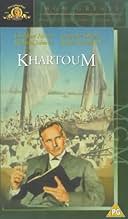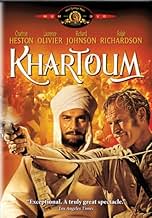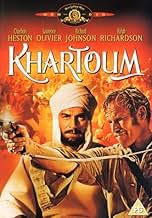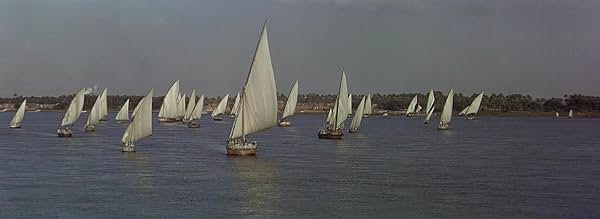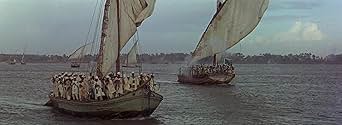Khartoum
- 1966
- Tous publics
- 2h 14m
In the Sudan, in 1884 to 1885, Egyptian forces led by British General Charles "Chinese" Gordon (Charlton Heston) defend Khartoum against an invading Muslim Army led by a religious fanatic, M... Read allIn the Sudan, in 1884 to 1885, Egyptian forces led by British General Charles "Chinese" Gordon (Charlton Heston) defend Khartoum against an invading Muslim Army led by a religious fanatic, Mohammed Ahmed el Mahdi (Sir Laurence Olivier).In the Sudan, in 1884 to 1885, Egyptian forces led by British General Charles "Chinese" Gordon (Charlton Heston) defend Khartoum against an invading Muslim Army led by a religious fanatic, Mohammed Ahmed el Mahdi (Sir Laurence Olivier).
- Nominated for 1 Oscar
- 3 nominations total
- Herbin
- (uncredited)
- assistant, messenger to Gordon
- (uncredited)
- Director
- Writer
- All cast & crew
- Production, box office & more at IMDbPro
Featured reviews
Directed by Basil Dearden and written by Robert Ardrey, Khartoum is an effective historical story piece that has wisely spent its budget to make it looks fabulous. Shot in Ultra Panavision and Technicolor on location in Egypt, it goes without saying that the film needs to be witnessed on the biggest screen available to you. As is normally the way in this type of film, historical accuracies come under scrutiny, to which Khartoum, except for a couple of major character meetings that never happened, is happy to hopefully entertain while it educates. But it's talky, very talky. Which while that works for those who like a touch of political intrigue in their historical epic diet, those more inclined to gorge on action over substance movies are sure to still be hungry come the end. What action there is is excellently choreographed by stunt coordinator Yakima Canutt, and as productions go, Khartoum is lavish and acted with no little skill by a fine cast (Ralph Richardson, Michael Horden & Nigel Green complementing Messrs Heston & Olivier).
But Khartoum is something of an enigma in that it has a lot going for it yet it remains a genre piece that's hard to recommend with confidence. In fact it's very much like another of Heston's historical epic pictures, 55 Days at Peking, in that it has many fans yet is rarely spoke about in genre circles. Of course there's now issues in this day and age as regards races and how they are portrayed, so for the politically correct amongst us, it's probably best to avoid this "touchily topical" period in Heston's career. And while Ardrey's screenplay was nominated for an Academy Award, one can't help yearning for some more depth given to the lead players, Gordon & The Mahdi, as opposed to expansive conversations involving political machinations back in Blighty. However, its literary value is still very high, which when coupled with the magnificent visual touches (Edward Scaife on cinematography duties) make it a genre piece of note; to the discerning observer that is.
A mixed bag for sure, but it doesn't waste the money afforded it, while it's certainly far better than some of the silly and shallow epics that came our way post 1970. So a cautionary 7/10.
The picture has extraordinary interpretations from main actors . Charlton Heston as the thoughtful and impulsive General Charles George Gordon is top-notch and Laurence Olivier as the fanatic Muslim is awesome . Heston actually did bear a remarkable resemblance to Major General Gordon , but he was considerably taller than the real Gordon . While Laurence Olivier has an extreme make-up to incarnate the religious fanatic , Ahmed El Mahdi , ¨the Expected One¨ . The support cast is equally outstanding , thus : Ralph Richardson (as Gladstone), Nigel Green (Wolsey) , Peter Arne (Kitchener) , among others . The film was based on facts , though was really criticized for neglecting to mention the many very good reasons why Prime Minister Gladstone was reluctant to send an army into the Sudan . The colorful and shimmer cinematography by Edward Scaife is magnificent , being well reflected in desert landscapes ; it was shot in Ultra Panavision , though was later reduced for exhibition in 70mm and 35mm release prints . Production design is overwhelming , it is the best part of the film , including a giant screen originally exhibited in Cinerama venues . Battles staged by Yakima Canutt are spellbound and spectacular . Frank Cordell's musical score is rousing and impressively adjusted to historical film . The motion picture was perfectly directed by Basil Dearden , though Lewis Gilbert was attached as director at one point . The yarn will appeal to historic epic buffs and Charlton Heston fans . Rating : Very Good . Above average, well worth watching .
He was also distrusted by the Establishment. A brilliant tactician and commander of troops he was constantly passed over for postings abroad because he was unpredictable. When he was asked to report on the grievances of the Basuto people by the British administration in South Africa, he sided with the Basuto and was shipped home very quickly. As Captain Willard says in 'Apocalypse Now': "They didn't dig what he had to tell them." You have to remember, too, that Gordon was a national hero. This was like firing Norman Schwarzkopf after the Gulf War.
The film fails to touch the depths of Gordon's character and in some cases is well off the mark (Charlton Heston seems far too interested in that Egyptian dancer!). We are shown that Gordon could be ruthless in the pursuit of justice (he executes a servant for theft, regardless of any personal feelings).
The fact remains that Gordon was a man of enormous moral and physical courage. He would not desert Khartoum and leave the people to be slaughtered. It now seems likely (and more in character) that he died fighting to the end.
The film is a tribute to that courage and some of the best moments occur when we are allowed to see the twinges of self-doubt and anxiety that Gordon suffered and overcame. The well-staged action scenes are like decoration on the moral diemmas at the heart of the film. Charlton Heston is physically wrong for the part but gives one of his best performances. He isn't outclassed by Olivier in any way, an achievement in itself.
Did you know
- TriviaKhartoum (1966) was analyzed by David Levering Lewis in the 1995 book "Past Imperfect: History According to the Movies," edited by Mark C. Carnes. The article notes that producer Julian Blaustein sent a copy of the script to the real-life Mahdi's grandson, who responded that although his grandfather and General Charles "Chinese" Gordon never actually met, "...it's a very fine script." When Blaustein apologized for this error, the grandson replied, "Ah, but Mr. Blaustein, they should have."
- GoofsPrime Minister Gladstone is shown in Parliament sitting on a red bench. The benches of the House of Commons have traditionally always been green.
- Quotes
Col. J.D.H. Stewart: Why did you let them talk you into this mission?
Gen. Charles 'Chinese' Gordon: As is well known, I, ah..regard myself as a religious man, yet I belong to no church. I'm an able soldier, yet I abhor armies. I can even add that I've been introduced to hundreds of women, but never married. in other words, no one's ever talked me into anything.
- Alternate versionsThe cinema version was uncut but UK video and DVD releases were cut by 29 secs by the BBFC to edit footage of dangerous horsefalls.
- ConnectionsEdited into Au coeur du temps: Raiders from Outer Space (1967)
- How long is Khartoum?Powered by Alexa
Details
- Release date
- Country of origin
- Language
- Also known as
- Khartoum - Aufstand am Nil
- Filming locations
- Production company
- See more company credits at IMDbPro
Box office
- Budget
- $6,000,000 (estimated)
- Runtime
- 2h 14m(134 min)
- Aspect ratio
- 2.76 : 1



